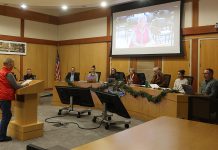Healdsburg City Council and the city’s administrative services and finance director, Heather Ippoliti, have started to review the city’s budget for the next fiscal cycle. The council met several times last week in both closed and open session meetings to discuss the city’s biennial budget for 2020-21 and 2021-22 and the necessary budget changes and cuts that will need to be implemented to soften the blow from the COVID-19 related economic recession.
Budget changes must be made in order to compensate for the decrease in revenue that the city is expected to receive. So far, some of the major proposed changes to the budget include:
• eliminating the assistant city manager and deputy clerk positions;
• providing less training sessions;
• issuing a money transfer of $500,000 annually from Measure V to the general fund to bolster funds;
• waiting to hire a planning director;
• eliminating a senior planner position;
• reducing facility improvement and streets projects;
• leaving the additional police officer and dispatcher positions vacant; •
• defunding the police analyst position;
• using $500,000 of pension stabilization funds to pay for 2021-22 pension costs.
“We normally wouldn’t recommend hitting the pension stabilization fund, we normally wouldn’t recommend using Measure V funds, but these are extraordinary times … And we do have plans to pay that back over time, but some of the things Heather is going to be talking about is to really get us through the next couple of years with the hopes of the economy recovering three to four years out,” Healdsburg City Manager David Mickaelian said of the proposed changes.
The funds that will be the most impacted are those that are funded by Transit Occupancy Tax (TOT) dollars.
Ippoliti added that the full economic impact of the coronavirus pandemic is still not known at this time.
There are also other outside factors that will affect all of the city budgets.
“These changes include a 5% increase in medical premiums annually, a 12% increase in workers’ compensation annually and increased pension costs and having to pay unfunded liability. Another change affecting the budget is increased maintenance services fees,” Ippoliti explained.
With various factors coming into play, Ippoliti discussed how the general fund budget looks in terms of projected revenue and expenses.
General fund revenue
“Sales tax projections are expected to decline in 2021 by about 1.3% under fiscal year 2019-20 and then increase by 6.1% in 2021-22. They are assuming that it will take us about five years to get back to the 2018-19 level of sales tax,” Ippoliti said, noting that the city modeled its sales tax impacts based on its analysis from previous recessions, plus a review of industry economists and news reports.
She said this model assumes recovery gets underway in the later part of the 2021 fiscal year, however, there is also an assumption that there will be loss of business and a change in consumer purchasing habits. For instance, people may not want to go out to eat at restaurants as often as they did before the pandemic for fear of being exposed or feeling uncomfortable in a crowded dining room, or folks may choose to shop online at big box stores instead of going into their local stores and boutiques.
Consequently, Ippoliti said that she is both anticipating a loss in sales numbers and a loss of businesses.
The sales tax revenue shortfall for the current fiscal year is estimated to exceed $944,769. That’s $687,117 from general fund and $257,652 from Measure V.
However, in terms of property tax revenue, Ippoliti said she does not expect to see too drastic of a change.
“Property tax is just the same as always. We’ve got the residual receipts that are expected to remain flat similar to this fiscal year, an increase rate of about 2% each year,” she said.
For development permit revenue, Ippoliti said she is budgeting for a conservative amount of revenue just to be safe.
“We are budgeting conservatively despite expected revenue from two development projects,” she said.
In regard to franchise fees, a proposed garbage franchise agreement, which was presented to council and approved on May 18 would increase revenues by 50% beginning January 2021.
There is also a change in money transfers from Measure V to the general fund.
“It includes transfers to the general fund from Measure V for the four public safety positions. There are four positions funded — two firefighters, a police officer and a dispatcher — at about $448,000 a year. What’s included, is a transfer each year of $500,000 from Measure V to the overall support of public safety,” Ippoliti said, explaining that this is one of those unusual measures that they are proposing because of the extraordinary situation at hand.
Perhaps the most troubling revenue projections are those associated with TOT.
Analyst Maurice Robinson, who the city contracted with to complete TOT projections, used a three-scenario set of U.S. forecasts to project Healdsburg’s TOT dollars. The scenarios are: optimistic, where there is a shallow recession; pessimistic, where there is a deep and long lasting recession; and base case, where there is a moderate recession. The forecasts vary over near-team and converge in 2024, according to Robinson.
In addition to the length and shape of the recession, three other variables will affect future TOT revenue for the city: what the annual average growth rate for hotel room revenue would have been, when Montage will open and how much demand will Montage produce.
Robinson said there was a projected 3% growth rate for the city’s existing hotel property room revenue. While Montage was slated to open in November, it might not open until February 2021 due to the construction delay. Montage will account for half of the city’s TOT revenue. He said they assume 50% of Montage’s demand will be new.
Based on these variables, the TOT revenue shortfall for the current fiscal year is estimated to exceed $2,085,122. Broken down, that’s a shortfall of $276,446 for the general fund, $426,446 for Measure S and $1,382,230 for community services.
General fund expenses
Ippoliti said a very large portion of the general fund goes toward public safety, with fire being 25% and police being 45% for a total of 70%.
Expenses from the city council budget include wages and benefits, support to local organizations like FFA and council meeting video services, among others.
In terms of legal expenses, there are about $250,000 in legal expenses for this year and there is an estimated amount of $270,000 for the next fiscal year.
The city manager’s office budget and expenses includes administration, the city clerk, human resources, payroll and community housing. The estimated total expenditures for 2019-20 for the city manager’s office is $2,066,107. The proposed expenditures for 2020-21 is $1,846,952.
“It is a very bare bones budget,” Ippoliti said, noting that while the assistant city manager role is eliminated for now, the city can always bring back the position if the funding allows for it in the future.
To curb planning and building expenses, the city will keep interim planning director, David Woltering, on until December. Having an interim director means the director has a limited amount of hours as part time staff and therefore, less benefits have to be paid. The city will start the search for a new director in the new year.
“With everything proposed, you end fiscal year 2021-22 with a reserve of 21.3%. The council policy is at 30%,” Ippoliti said.
Mickaelian said while he is not excited about the 21.3% reserve, he said it allows the city to maintain operations.
“And it also allows us a chance to really reevaluate where we are in October, or any time, to adjust if things get better or worse,” he said.
Next steps
The city will continue its ongoing series of budget review meetings. In an open meeting on May 26, the city will meet to discuss the city’s utility and airport funds. The meeting was supposed to occur May 18, however, due to technical issues resulting in no sound for the meeting’s video feed, the meeting was continued to May 26 where they will re-do the presentation.
The city also has to discuss the community services budget, one of the budgets that will be affected by the loss of TOT revenue.
If all goes according to plan with the budget study sessions, the budget will be voted on for approval at the June 1 city council meeting.









